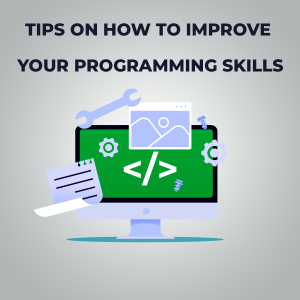The ability to create programs is a very valuable skill nowadays. First, a programmer can work remotely, which means he can find work anywhere. Secondly, good programmers automatically fall into the category of highly paid specialists.
Even if you are already doing development on a professional level, you still need to learn to program and improve your skills. Choosing a career as a developer means that you “signed up” for lifelong learning.
There are some secret tricks to speed up your learning tremendously. Let’s take a look at them.
Writing code
The best way to learn how to write code is to write it. If you are reading a book or article and you come across a sample code, rewrite it in the editor and try to make it work. When it works, start “playing” with it. Change something. Think about where else you can apply such code and how you can do the same differently. Play with the code.
Book tips and tricks will only partially help you. You can truly learn only through practice.
Drive
The best way to become a good expert in any business is to do it. Many and often. It takes strong motivation to learn. One way to motivate yourself is to give yourself time to master.
Concentration
If you want to learn something quickly, you cannot afford to waste your time. Pick one language (start with JavaScript), one framework (start with React), one book, one course, one topic, etc.
Whatever you choose, focus on it until you reach a sufficient level of skill, and only then move on to something else.
By learning more than one language, you can look at many things from different angles and even better understand your primary language.
Reading
Many useful things related to software development can be learned from books.
You can find numerous videos and online courses on YouTube or elsewhere, but books are standard repositories of knowledge and culture of development.
Reiteration
If you want a concept to move from familiar to long-term memory, repeating this topic will help you. Most developers make the same mistake: they quickly study a book or article, and the next day they forget what they read.
Therefore, repeat what you read the next day. Check out what you remember. And after a couple of days, check it again.
Alternate learning activities
Some people learn better by reading and others by watching videos. But, if you mix different types of learning, then you can repeat the concept under study many times, each time considering it from a different angle. practice writing code. In this way, you can get all the benefits of repetition and practice.
Work on projects
Learning a concept does not mean that you will be able to apply it when creating this application. After you’ve spent a few weeks exercising, you can switch and try to build something of your own.
Development principles are more valuable than frameworks and languages
Frameworks and APIs are changing rapidly. And the principles of software design are practically eternal. They can be learned once and then simply applied.
Examples of principles:
1.“A small change in requirements should only lead to a small change in implementation,” a paraphrased quote from A Practical Handbook for Software Development.
2.”Do One Thing (DOT)”. A simplified version of Douglas McIlroy’s Do One Thing and Do It Well (DOTADIW) formulation.
This principle applies when writing functions. No function should be responsible for retrieving data, processing it, or displaying it.
(It’s time to break down your React components into smaller ones!)
3.” Program the interface, not the implementation” – “The Gang of Four”
the book “Techniques of Object-Oriented Design. Design Patterns ”.
4.”Give preference to composition over imitation” – “The Gang of Four”, same book.
5.” Avoid shared mutable state”
6.”Premature optimization is the root of all evil” – Donald Knuth.
7.”You don’t need this.” The YAGNI principle: Don’t write unnecessary code for the future.
Share knowledge, document, teach others
Learning how to write code is only half the battle. When you start working with other developers, they will review your code and time to challenge your choice. And you may find that you are not well versed in the subject to substantiate your point of view. Practice explaining your position. Document what you’ve done. Teach colleagues what you have learned.
More practice
Everyone knows that practice is the key to developing skills. But to develop, it is not enough to practice the concepts you already know. You need to complicate your task and go beyond the usual. If you constantly practice things that are even a little beyond your existing body of knowledge, you will become a great specialist.




